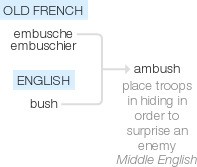Ambush
Middle English (in the sense ‘place troops in hiding in order to surprise an enemy’): from Old French embusche (noun), embuschier (verb), based on a late Latin word meaning ‘to place in a wood’; related to bush1.
wiktionary
From Middle English enbuschen, from Old French enbuscier, anbuchier(verb) (whence Middle French embusche(noun)), from Old French en- + Vulgar Latin boscus(“wood”), from Frankish *busk(“bush”), from Proto-Germanic *buskaz(“bush, heavy stick”). Compare ambuscade. The change to am- from earlier forms in en- is unexplained. More at bush.
etymonline
ambush (v.)
mid-14c., embushen, enbushen,inbuchen, "to hide in ambush," from Old French embuschier (13c., Modern French embûcher) "to hide, conceal, lay an ambush," from en- "in" (from PIE root *en "in") + busch "wood," which is apparently from Frankish *busk "bush, woods," or a similar Germanic source (see bush (n.)). The notion probably is "hide in the bush," or "lure into the bush." Related: Ambushed; ambushing.
ambush (n.)
late 15c., embushe, "troops concealed to surprise an enemy," from the English verb or from Old French embusche "an ambush, a trap" (13c., Modern French embûche), from embuschier "to lay an ambush" (see ambush (v.)). Non-military sense from 1570s. Figurative use by 1590s. Earlier was ambushment (late 14c.), from Old French embuschement, Medieval Latin imboscamentum.
